In a surprising turn of events, the beloved superhero card game, Marvel Snap, has found itself unwittingly caught in the crossfire of a larger geopolitical issue. The U.S. government’s recent actions against ByteDance, the Chinese company that owns TikTok, have led to the unexplained offline status of Marvel Snap for American players. This development not only highlights the complexities of digital governance but also raises questions about the future of games that fall under the bureaucratic umbrella of foreign ownership.
On January 18th, American players were abruptly cut off from accessing Marvel Snap. Reports poured in from users who suddenly found themselves unable to log into the app, generating a wave of frustration in the gaming community. While the game remains listed on platforms like Steam, accessibility issues dominate discussions, fostering a sense of uncertainty among devoted players. The developers, Second Dinner, quickly acknowledged this unexpected hurdle, promising restoration within 24 hours. Such rapid responses are indicative of a tight-knit industry that values its player base, yet this assurance does little to alleviate the immediate disappointment.
To appreciate the ramifications of the Marvel Snap debacle, it’s essential to understand the backdrop of ByteDance’s ongoing tussle with the U.S. government. Lawmakers have expressed concerns that TikTok serves as a conduit for the Chinese government to potentially surveil American citizens. The fierce debate crystallized in March 2024 when Congress directed ByteDance to divest its U.S. operations or face a complete ban. In this fierce landscape, TikTok’s legal maneuvers culminated in a suspension that inadvertently collateralized games like Marvel Snap. The stakes are incredibly high, affecting millions of users and a vibrant market.
Marvel Snap is not just another mobile game; it is rooted in the expansive Marvel Universe, which boasts a fanatical following. The game’s publisher, Nuverse, also operates under ByteDance’s umbrella. This connection amplifies the stakes, establishing Marvel Snap not merely as a game but as a symbol of the broader friction between technology and government regulations. As confusion grows regarding why some Nuverse titles are still available while Marvel Snap faces restrictions, one can’t help but wonder about the underlying administration failures.
As news of the Marvel Snap outage spread, social media platforms lit up with player outcries, memes, and alternative sources for game content. This collective response reflects a vibrant gaming culture that thrives on community interaction and engagement. Paradoxically, while players bemoan the temporary loss of the game, their rallying serves to foster bonds among users. This situation also places video game streaming under a scrutinizing lens, as many creators rely on platforms like TikTok for exposure and content sharing. The intertwining of TikTok and gaming illustrates how disruptions in one field can unpredictably affect another.
The crux of this issue lies in the evolving landscape of digital governance intertwined with popular culture. As Second Dinner works diligently to restore Marvel Snap access, the gaming industry must grapple with the implications of foreign ownership amidst rising national security concerns in the United States. The potential for similar disruptions is a sobering thought for gamers, developers, and various stakeholders alike. The fallout from geopolitics may very well signal a shift toward more localized regulations and future scrutiny of foreign-owned gaming companies.
Ultimately, the temporary shutdown of Marvel Snap serves as a clarion call for transparency in the games sector amid increasingly complex regulations. As the lines blur between entertainment, technology, and national security, the industry must adapt. Players await the triumphant return of Marvel Snap, but beyond the excitement of resuming gameplay, this moment invites critical reflection on ownership, access, and the rights of users in a digital age. Let’s hope for not just a return to the gaming world but a more robust conversation around these pressing issues that touch all of us as players, fans, and citizens.


Leave a Reply